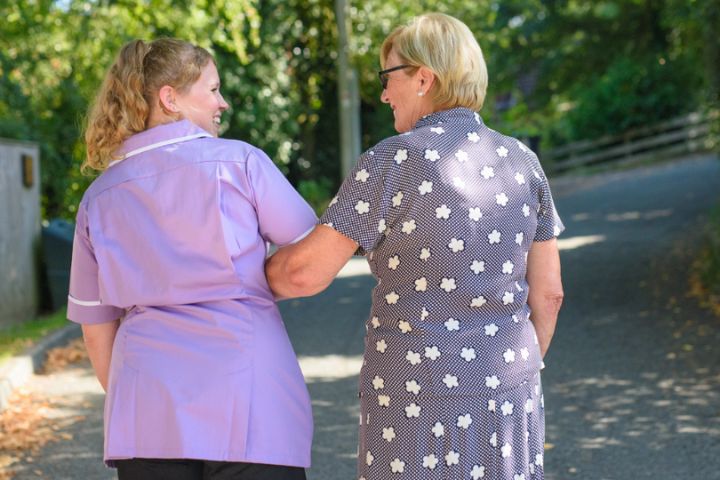
National Office
Please enter the office location/term above to receive results for your closest office as well as information matches
Older people have a wealth of skills and knowledge to contribute to society. While most have good health, risk factors such as living with multiple physical health conditions, loneliness and social isolation leave some vulnerable to developing mental health conditions such as anxiety and depression.
Everybody has a state of mental health: it’s the way we think, feel and cope with life’s ups and downs. As we age, it’s likely that we’ll experience times of positive mental health, as well as times where we are low and in need of some support. For some, this may mean feeling down or worried but others may need professional help to feel better. Older people often experience physical and mental health problems at the same time. This ‘double whammy’ can be extremely detrimental to someone’s ability to carry out basic daily living activities, reducing their independence and consequently their quality of life. Looking after our mental health is therefore just as important as staying physically fit.
I’m a specialist social worker for older people, and I founded Radfield Home Care Bexhill, Hastings and Battle with one simple aim: to keep people connected to the things that matter most to them, in the comfort of their own home.
People often come to us for care and support after they’ve been struggling for a while. Our experience tells us that good quality home care can help someone maintain a healthier lifestyle and in turn improve their mental wellbeing. It’s so easy to neglect yourself when you’re feeling low but we make sure that our clients eat well, help them maintain personal hygiene and provide a familiar face, companionship and a listening ear. It’s amazing what a difference looking after these things can make!
If you’re worried about a loved one’s mental health and the impact this is having on them, why not give us a call to discuss how we might help?
Ask yourself some questions about your loved one’s mental health.

Home care is when a trained care professional comes to your home to provide care and support. It’s a highly personalised service and can be delivered as visiting or live in care. If your loved one is struggling to look after themselves, it can contribute to mental health difficulties such as feeling low or anxious. But don’t worry, we can help.
Radfield Home Care services can include:
Whether you need support with personal hygiene, getting dressed, or mobility support, we can help.
We can remind you about medication, or even help administer it if needed. There’s no need to worry about missing a dose again!
From meal preparation to feeding support, we can support you and your dietary needs.
More than just personal care; we provide companionship and emotional support.
Whether you need personal care throughout the night, or just the reassurance of knowing someone else is in the house, we can support you.
Need help with the cleaning, laundry, or washing up? We’ll take care of it.
We can help you get out to the shops, or take care of it ourselves for you.
And it’s not just humans – we’ll make sure your pets are well cared for too!
At Radfield Home Care Bexhill, Hastings & Battle, we’re proud to say that we make a difference to our clients lives. Here are just a few ways that we’ve found ways to help them improve their mental health recently…
James has dementia, but being independent is very important to him. He needs some support, but told us that it helps his self-esteem to do as much as possible for himself. Because of that, we support him to manage his own medication safely. By taking an enabling approach, we’re able to promote James’ independence, prevent him from losing vital skills, and improve his confidence.
Betty’s husband died last year. Her Radfield care professional provides valuable companionship, making her feel less isolated and alone. They go to the supermarket together, take walks along the seafront, and get a coffee when they feel like it. Betty says that she feels happier and brighter after a trip out.
Valerie always loved making home-baked pastries on Sundays. When her oven broke, she struggled to learn how to use the new one, and she missed her hobby – and her weekly treat. Her Radfield care professional has supported her to learn how to use the new oven and bake her favourite breakfast every Sunday. Valerie feels good about overcoming this challenge and can look forward to home baking every week.
Mary used to really enjoy going to her local salon to have her hair done, until her health declined and she found it harder to leave her house. Instead, she started washing her own hair and leaving it to air dry – but she missed the salon experience. Now her carer gives Mary a full hair wash and blow dry each week. Mary loves it – and it’s made a huge difference to her mental wellbeing as she feels good about her appearance.
Tony and Jenny have daily care from our team. For two hours a week we support them to go out to tea rooms, garden centres, National Trust places, and even the theatre. Their family lives overseas, and this is an excellent way for them to stay active and have a social life.
May uses a walking frame, but loves to walk around the local area and admire the flowers. Her carer takes her for a walk regularly, and May really enjoys it.

It can feel daunting to start a conversation about mental health. However, if you’re concerned about someone, it’s important to try and start a conversation.
Please note: if you are concerned for anyone’s safety or believe that someone is considering ending their life, take action immediately. Call 999 in an emergency.
If you’re concerned about your own or someone else’s mental health, we’ve put together some advice.
We know that, depending on your circumstances, you may not be able to manage all of these. However, if you’re finding lots of them difficult, it may be a sign that you need some extra support.
· Eat regularly. If you can’t manage a full meal, make sure that you always have healthy snacks on hand for the times you do feel hungry.
· Stay hydrated. Dehydration can have serious effects on your physical and mental health.
· Take your medication as prescribed. If you’re in pain or feel unwell, it’s no surprise that you might feel low. If you’re experiencing unpleasant side effects, talk to your GP, nurse or specialist.
· Get outside if you can. A short walk or sitting in the sunshine can make a huge difference to your mood.
· Keep in contact with loved ones. Even if your family lives far away or can’t visit as often as you’d like, can you keep in touch with them over the phone or online?
· Talk to a healthcare professional. If you feel consistently low, talk to your GP. They may be able to refer you to a counsellor, or suggest medication that might help.
· Ask for practical help. If you’re struggling to manage your home, personal hygiene, or medication, consider whether you need someone to help you. This might mean having a cleaner pop in once a week, or a carer coming to support you each day.
If you would like to speak to someone about the possibilities of care at home for yourself, or a loved one, and the benefits this may provide for mental health, reach out to our team today. Your local care team in Bexhill can be reached on 01424 559 202 or by clicking here.
Get in touch with your local Radfield Home Care office today and find out more about the support we offer and the difference we can make.